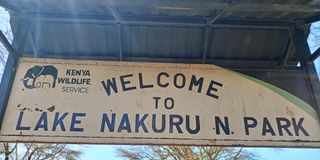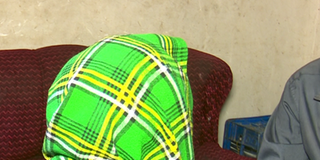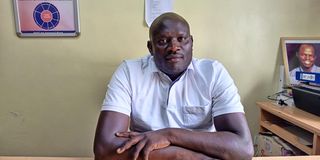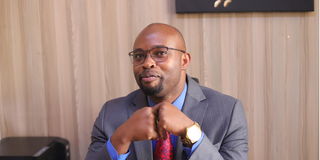Giza Ziwani: How bufallo saved woman from rape in Lake Nakuru National Park

A sign post indicating entry into Lake Nakuru National Park.
The wind howled through the darkened shores of Lake Nakuru National Park as Mary Nangila (not her real name) lay helpless on the cold, wet grass, her clothes torn, the barrel of a gun pressed against her head.
Two-armed Kenya Wildlife Service (KWS) officers towered over her, their hands roughing her and unpleasantly touching her genitals, their intentions unmistakable.
Recalling the inhuman experience that she went through in January 2025, Nangila tells Mtaa Wangu she could barely breathe.

(Covered in green shawl) Nangila a victim of attempted rape by KWS officers during an interview with Mtaa Wangu.
Her body was frozen in terror as the officers’ intent was to rape her, after they caught her inside the park while in possession of fish from the lake.
“I had left home for the lake at 9 pm in the company of two others, including the person who had hired me to carry the fish. On arrival, we waited for him till 1am but he did not show up. I opted to ferry fish for another person but before we could leave, we heard screams from a far distance. We had to run away in fear of KWS offices who we suspected were around,” she narrates.
While on the run, Nangila notes they met another batch of officers who were patrolling the park, who caught up with her after falling down.
“Two officers caught me and asked what brought me to the park. I told them I was just helping the fishermen so that I could get something to feed my children. They however went ahead and demanded money so that they could release me. I did not have but I was ready to give them my phone in exchange for my freedom. They insisted that they wanted cash, and one of the officers tore my clothes and removed my undergarments. The other one was squeezing my breast,” she says amid tears.
In a twist of fate, salvation came, not from another human, but from nature itself.
A buffalo strayed too close, sending the officers into a panic and their focus shifted to the beast giving her a chance to escape.
Nangila notes the brief moment was all she needed to run.
To this day, the sight of the national park, where she lives a few metres from, sends chills through her body, reviving the horror she barely survived.
We ask how she found herself in the business of fishing.
The mother of four notes that she ventured into the risky business after her husband died in a road accident, leaving her the bread winner of the family.
Nangila notes that she started as a fisherwoman but later abandoned it after she developed health complications forcing her to be a loader instead.
According to her, despite the Lake bearing challenges, many have found a source of livelihood from the illegal business with the cold water and wildlife not their biggest scare but the KWS officers.
“As a woman the officers are my biggest fear. If you cross paths its either they beat you, take your catch, ask for money or rape you. This risks women contracting sexually transmitted diseases because no protection is used when these officers force themselves on you,” she says as she explains that the officers asked if she had a husband while assaulting her.
Hers is not the only story.
Women in Barut and Mwariki, mostly fisherwomen and loaders, say they are being preyed on by the KWS officers.
Caught within the protected area, they are given a cruel choice to either submit to the officers’ sexual advances or face arrest and later prosecuted with a possibility of hefty fines or jailed.
For many, there is no way out.
Other victims of sexual assault
We seat with, the CEO, Centre for Enhancing Democracy and Good Governance (CeDGG), Paul Masese, who has interacted with two ladies living with the trauma of an alleged rape by KWS officers.

CEO, Centre for Enhancing Democracy and Good Governance (CeDGG), Paul Masese, during an interview on March 28,2025.
He notes that many cases go unreported as the victim’s fear stigmatization by the community and victimization from the wardens.
He further notes that the cases are less spoken about as the women are protecting their marriages.
“As I sat with these two ladies *Naomi and *Ann both in their late 20s, they spoke as though they did not know that their rights were violated and what befall them was a crime. The two were found within the park confines on February 16, 2025 in possession of fish by three KWS officers. They were arrested but they were given options; being taken to court or bowing to their sexual advances from two officers,” he says.
Further, Masese mentions that the women who fear to come out and share what befall them, feel like they had consented to the heinous acts extended to them, noting that their voices have long been drowned in silence, buried beneath shame and fear.
“Owing to the fact that the lake is a protected area, once caught inside the park the women are at the mercy of the KWS officers. Since the women have heard of prosecuted cases where one is awarded fines of up to Sh 300,000 and jail term getting to two years, some concede to these human rights violations without an option,” he notes.
What does the law say?
We seek legal opinion from Abuya Mogendi an advocate on whether these women stand a chance to get justice on violations they go through in the hands of KWS officers.

Abuya Mogendi an advocate , during an interview with Mtaa Wangu in his office on March 28,2025.
Mogendi notes that if the primary evidence is tampered with, it is hard to prosecute rape cases. At the moment he advises psychosocial support for the victims to deal with the trauma.
“A victim’s body is the crime scene in rape cases. If they never made it to the hospital for examination or report the case it is hard to prove to the court that indeed they were sexually assaulted. Justice may be denied for now. However, should these perpetrators be repeat offenders, one day the law will catch up with them,” he remarks.
Responding to the grievous allegation against KWS, Lake Nakuru National Park in charge Gideon Kebati, in a phone interview, dismisses the cases as mere allegations, noting that should this be happening, the victims should be able to report so that investigations can be conducted.
“At this point we have not received any official complaints about the harassment. Victims can report this to local authorities starting with chiefs, police stations and IPOA and allow for investigations to be conducted. We need proof for such cases,” he says
Masese and Mogendi recommend that an independent body be formed to oversee the complaints by civilians on the conduct of the KWS officers.
Tomorrow: We highlight the story of two men who went into the Park, never to be seen again.

